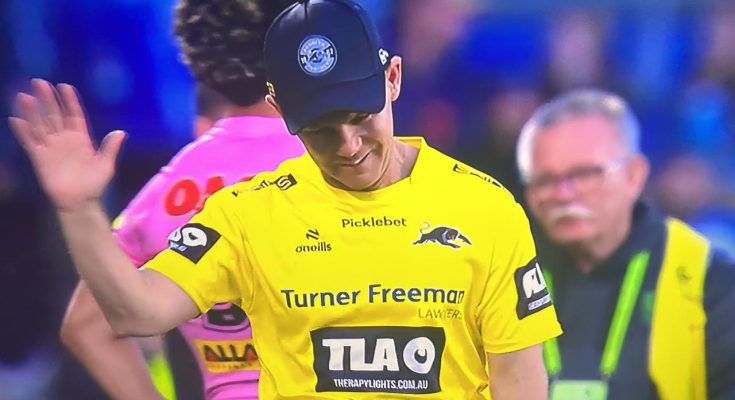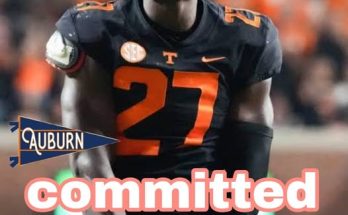The Penrith Panthers, one of the NRL’s most dominant teams in recent years, have been rocked by a serious disciplinary blow following a controversial incident on the Gold Coast. The NRL has officially imposed a \$50,000 fine on the club and handed a five-week ban to one of its trainers, Corey Bocking, for breaching rules around field access and conduct during a game. This move by the governing body signals a clear warning that even elite clubs are not above the standards of fairness, safety, and sportsmanship that the NRL demands across all levels of play.
The incident in question unfolded during Penrith’s recent clash with the Gold Coast Titans, a game that already had its fair share of intensity and emotion. But it wasn’t a player that took center stage in the disciplinary aftermath—it was a member of the club’s support staff. Corey Bocking, one of the Panthers’ blue shirt trainers, found himself at the heart of the storm after he entered the field of play and was deemed to have interfered with the match in a manner inconsistent with his role and authority. While trainers are allowed on the field in a limited capacity to tend to injured players or deliver messages, the NRL has long held that these permissions are not a license to influence play, obstruct opponents, or distract officials.
The NRL’s match review and integrity unit closely analyzed the footage of the incident and found that Bocking’s presence and actions constituted a serious breach of protocol. Their investigation concluded that he entered the field without permission and remained there for longer than permitted, disrupting the flow of play and potentially compromising the fairness of the game. While the NRL did not detail every nuance of the interaction, the severity of the sanctions levied against both Bocking and the Panthers tells the story clearly: the league viewed this breach as significant and unacceptable.
For the Panthers, this is more than just a financial penalty or a loss of a staff member for five weeks. It hits at the culture and discipline of a club that has prided itself on setting the benchmark in recent seasons. With multiple premierships and a reputation for grooming young talent into world-class players, Penrith has positioned itself as a juggernaut of modern rugby league. But with that success comes scrutiny, and incidents like this open the door for critics to question whether the club is bending or even breaking the rules to maintain its edge.
Coach Ivan Cleary has addressed the issue publicly, expressing disappointment but also pledging to support Bocking through the consequences. Cleary emphasized that while the incident was regrettable, it did not reflect a pattern of behavior and that the club would learn from the experience. He also noted that Bocking had taken the punishment hard and was struggling mentally, as the fallout of the ban has placed immense pressure on him personally and professionally. Cleary’s comments reflect the internal toll that such sanctions can take—not just financially, but in morale, reputation, and cohesion.
Still, the NRL’s hardline stance is part of a broader campaign to clean up aspects of the game that exist in the grey areas. In recent seasons, the league has cracked down on dangerous tackles, off-the-ball incidents, and on-field conduct. But just as importantly, they have turned their attention to the sideline figures—coaches, trainers, water runners—who, if unchecked, can play subtle but significant roles in shaping a contest. The league has made it clear that any actions that could influence the outcome of a match outside the legitimate contest between players will not be tolerated.
The \$50,000 fine, while a relatively small amount for a club with Penrith’s stature and revenue, sends a strong symbolic message. It’s a public mark against the club’s record, a reminder that no amount of success or silverware grants immunity from the game’s standards. Additionally, the absence of Bocking for five weeks strips the Panthers of a familiar presence on the field, particularly in tight moments when a trainer’s calm voice or medical judgment can be critical. In high-stakes games, every piece of the puzzle matters, and losing a key figure—even one off the field—can ripple into performance.
The timing of the ban also adds to its impact. The Panthers are in the thick of their finals push, navigating a challenging stretch of the season where form, fitness, and focus need to align perfectly. Every distraction, every setback, becomes magnified. And in a league where margins are razor thin, a misstep like this—even off the field—could be the difference between a top-four finish and an elimination game slog.
From a broader perspective, the incident invites discussion around the evolving role of trainers in modern rugby league. Once purely medical staff, many trainers now serve dual purposes—helping with player welfare while also relaying tactical instructions from the coaching box. This dual role can blur the lines and, in some cases, lead to actions that push the boundaries of what’s permissible. The NRL’s disciplinary action against Penrith is a firm reassertion of where those boundaries lie.
It also prompts clubs across the competition to reassess their internal protocols. What are the rules for field entry during play? Are staff properly trained to understand the limits of their role? Are there checks in place to ensure that messages are delivered within the spirit of the game? These are questions that all NRL teams will now be asking in light of the Panthers’ punishment. The cost of non-compliance is no longer theoretical—it’s painfully real.
Interestingly, this isn’t the first time Penrith has faced scrutiny over sideline conduct. In past seasons, the club has drawn criticism—fair or not—for perceived gamesmanship, including delayed injury calls and sideline antics. While nothing as severe as this latest incident had led to formal charges, the perception has lingered. Whether this latest penalty further fuels that narrative remains to be seen, but the club will be working hard to ensure it is viewed as an isolated mistake rather than part of a larger pattern.
Fans of rival clubs have been quick to react on social media, with some accusing the Panthers of arrogance and believing they’re above the rules. Others have defended the club, pointing out that such infractions can happen at any club and that the swiftness of the NRL’s action proves the system is working. For Penrith’s own supporters, there’s a mix of disappointment and resilience. The team has been through adversity before and emerged stronger. But there’s no question this latest episode has added a layer of tension to an already high-pressure campaign.
The NRL, for its part, has been unapologetic in its decision. Officials emphasized that the integrity of the game must be preserved at all costs and that breaches by off-field personnel are just as serious as on-field misconduct. They reiterated that trainers and other support staff are there to facilitate play—not to influence or disrupt it.
Moving forward, the Panthers will need to adjust quickly. Corey Bocking’s duties will likely be shared among other staff, though finding someone with his experience and rapport with players won’t be easy. Internally, the club’s leadership will be reviewing procedures and likely instituting stricter rules for sideline access. There’s also the challenge of managing media scrutiny and public perception as the team aims to keep its eyes on the premiership.
For Corey Bocking personally, the next few weeks will be tough. While he’s been an integral part of Penrith’s setup, the ban serves as a professional and personal low point. Support from within the club has been evident, but the mental weight of being the central figure in a high-profile sanction is significant. Whether he returns with the same role and responsibilities post-ban remains to be seen, but his experience will surely serve as a cautionary tale for trainers across the league.
In the end, the NRL’s disciplinary action against Penrith is more than a punishment—it’s a precedent. It’s a reminder that in a professional sport where every edge is pursued, there are still lines that cannot be crossed. Whether you’re a marquee player or a blue shirt on the sideline, the rules apply equally. And as Penrith now knows, the cost of overstepping those lines can be steep—financially, reputationally, and competitively.



